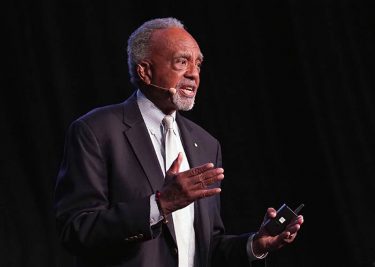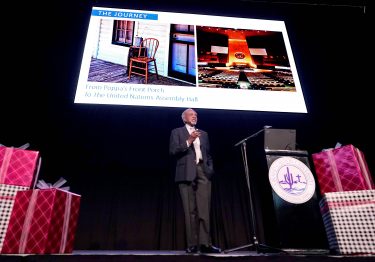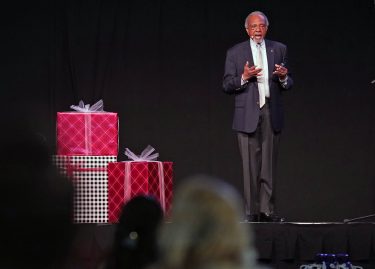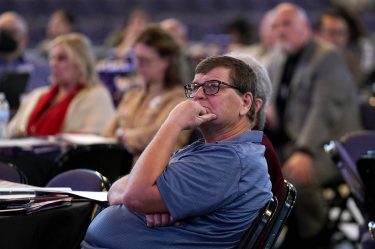
Story by Mike Kilen
Photos by Ralph Freso
GCU News Bureau
Dr. Meredith Critchfield tossed out a challenge.

“Our job today is to start to infuse love back into our workplaces, back into our schools and back into our communities.”
“I want to tell you a story,” she continued Monday to the more than 2,000 students and faculty of Grand Canyon University and GCU partner school educators at the Building Virtues Conference: Character Education in a Changing World at Grand Canyon University Arena.
Years before Critchfield became dean of GCU’s College of Education, she was teaching 10th grade English. The class wasn’t getting along with each other or with her. The standards, the testing and data were all there, but something wasn’t working in the classroom.
“At the end of the day, I wanted them to walk away as better humans,” she said.
Critchfield came up with an idea. She handed out little sandwich bags and pieces of paper to the 35 students and told them to anonymously write down something they love about every person in the class, a trait or character from the inside, and do it from the heart. They delivered them to every other person’s bag.
“And then they had 35 pieces that said what made them special,” she said.

A year later, students told her they still had the bag, and it means a lot to them. At graduation, they told her they still look at those notes sometimes. After college, some still told her that what others wrote “meant so much to me.”
“Thirty minutes of time has had a lifetime of impact on those 35 students,” Critchfield said. “That’s what we are here to think about today.”
That the people around you are loved and cared for.
Critchfield’s example led off a day of presentations and discussions by national leaders in character education on a timely topic, when COVID and politics have created worry and anger in our culture.
Clifton Taulbert knows all about tough times. The morning keynote speaker captivated participants in person and virtually by the story of his upbringing in the 1950s amid the South’s racial strife while his Mississippi sharecropper family worked the cotton fields. Taulbert went on to write the 1989 autobiography “Once Upon a Time When We Were Colored,” which became a 1995 film.
He also went on to become a leader in character education, writing “8 Habits of the Heart.” Those eight habits, he said, are nurtured in community, where neighbors change the world one “micro-dose of unselfishness” at a time.
“It is community that defines well-being of humanity,” he said.

“Character is not just about doing but about being and becoming and helping another person clearly understand they can become as well.”
The ordinary people in his life on the Mississippi Delta showed unselfishness to him, and that changed his life, from a field worker to lecturing at Harvard and speaking at the United Nations.
They didn’t leave him a legacy of stocks and bonds but much more, he said as he showed their black-and-white photographs on the big screen in the Arena.
His birth mother was a maid who raised six kids on $10 a week but still shared her hopeful attitude.
His great aunt wrote every Black college to send him books, and on Saturdays Taulbert was sent into that corner home library to read. He complained they were too hard.
“If they can write it, you can read it,” she told him, sharing her expectations. “You will get an education.”
His great-grandfather gave him perspective by taking him to town to show him the larger world. His great uncle showed him responsibility by hiring him to work in his icehouse as a boy.
His first-grade teacher showed him friendship by saying, “This is where you sit, these are your books and these are your friends,” he said. “She called me little professor.”
He later worked for a White woman in the segregated South who invited him into her house to eat lunch and asked him what he was reading. He told her old college textbooks. You need to go to the library for books appropriate to your age, she said.

“I can’t go to the library,” he told her.
She set down a stack of books for him to read. And kept bringing him books until he graduated from high school.
He called those people gifts that kept giving over the course of his life.
“I want you to clearly understand, don’t keep the gift wrapped up. Unpack the community, unpack the habits and let them live out in the presence of others,” he said.
Ordinary people made a different in his life, and now everything he does, he still does for them.
“This is what character does. It not only changes me but changes the world around me,” he said. “What can I do to make this world a better place, not just for me, but for others as well?”
Dr. Tracy Vasquez, Assistant Professor and COE’s Professional Growth and Development Program Chair, said Taulbert’s personal story helped listeners understand the importance of bringing virtues to the classroom.
“I think we are in a critical time for people learning how to communicate again and get along again,” she said. “We are figuring out how being kind is action – and how to bring our character back into community.”
She said the afternoon speaker, Dr. Marvin Berkowitz, offered strategic actions to bring it to the classroom.
Berkowitz literally wrote the book on character education, the 2021 “Primed for Character Education: Six Design Principles for School Improvement.”

The origin of the word character is “making a mark,” he said. We do that through our intellect, morals, civic virtues and performance.
“Every adult who is around children impacts their character, whether it is intended or not,” Berkowitz said. “Just so you know, that was a paraphrase from Aristotle 2,000 years ago.”
The co-director of the Center for Character and Citizenship at the University of Missouri-St. Louis said research shows that character education increases academic achievement. In school, it isn’t about handing out stickers or candy or rewarding students at assembly who show kindness.
“Character education is a way of being with others,” he said.
It’s about modeling character, building relationships and empowering and motivating students to act on it.
It starts with this: “Love the kids.”
The daylong conference included breakout sessions with numerous other topics and left teachers in training with a vital sense of its importance in often contentious times.
“The state of people and how they treat others is a reflection of its heart, so addressing character is addressing that heart issue,” said GCU junior Jocelynn Beeson. “We are doing more than educating their brains but trying to touch their hearts.”
Added freshman Chloe Matsick: “We are preparing the next generation to go into the world so they can change the generation after them.”
Grand Canyon University senior writer Mike Kilen can be reached at [email protected] or at 602-639-6764.
***
Related content:
GCU Today: Critchfield named Dean of College of Education
GCU Today: Educators share their passions behind teaching
GCU Today: Education faculty’s videos are a hit with students



































































